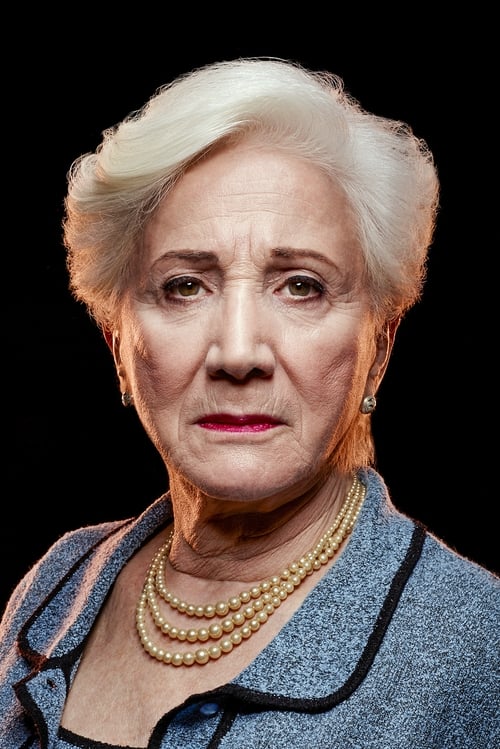Olympia Dukakis (June 20, 1931 – May 1, 2021) was an American actress. She performed in more than 130 stage productions, more than 60 films and in 50 television series. Best known as a screen actress, she started her career in theater. Not long after her arrival in New York City, she won an Obie Award for Best Actress in 1963 for her off-Broadway performance in Bertolt Brecht's Man Equals Man.
She later moved to film acting and won an Academy Award and a Golden Globe, among other accolades, for her performance in Moonstruck (1987). She received another Golden Globe nomination for Sinatra (1992) and Emmy Award nominations for Lucky Day (1991), More Tales of the City (1998) and Joan of Arc (1999). Dukakis's autobiography, Ask Me Again Tomorrow: A Life in Progress, was published in 2003. In 2018, a feature-length documentary about her life, titled Olympia, was released theatrically in the United States.
Description above from the Wikipedia article Olympia Dukakis, licensed under CC-BY-SA, full list of contributors on Wikipedia.
The ENFJ personality type is the action-oriented, people-centred character looking for and making connections between people. They are excellent glue for the team, assuming control and making sure that everything is planned, scheduled and organised, and that people are happy. They are excellent networkers who tune into what others want and are well-liked and popular among their colleagues. They have an innate sense of what is required and can genuinely make others feel really special. Consummate planners and organisers, they can juggle masses of activities and tasks at any one time, rarely dropping the ball and making sure each activity is given the right amount of attention and loving care.
The ENFJ personality type is the people organiser, warm, harmonious and an enthusiastic champion of people who just wants to ‘do good.’ They make sure the needs of the people are paramount and taken care of, then they will want to plan and get on with it. They can generally be found at the emotional heart of a group or body and will be the one making sure things get done. Like the ENTJ, they excel at getting on and doing but with a much more people, as well as task focus, but with no less energy, commitment or vigour. Articulate and confident the ENFJ will be persuasive and tenacious; the one voted the leader or committee chairperson. They will look for and make connections between people, be excellent glue for the team, everyone knows they can depend on the ENFJ. An ENFJ will use their considerable energies and enthusiasm to make things happen and these characteristics are infectious and can be excellent at creating a feeling of 'team' and keeping morale high.
The ENFJ personality type has high drive, bundles of energy and a commitment to ‘the cause,’ (whatever that cause is) which borders on the evangelical. Their energy levels increase the more people they have to meet and the more activities they have to arrange. Consummate planners and organisers, they can juggle masses of activities and tasks at any one time, rarely dropping the ball and making sure each activity is given the right amount of attention and loving care. This desire to ‘get it done’ can at times mean that the ENFJ becomes inflexible and a ‘controlling parent’ in their desire to ‘finish what we’ve started.’ Under such pressure they can lose their sense of balance and perspective but will ultimately bounce back because that is just what the ENFJ is built for.
As ‘Thinking’ is their weaker function, the ENFJ may suffer at times from being overly subjective and lacking a cooler, slightly more dispassionate eye on people and situations. This also means the ENFJ may bite off more that they can chew as their first priority is to say ‘yes’ and take the pain away for others. During such times the ENFJ may feel weighed down by the amount of work to which they have committed and so may see themselves as ‘victim,’ feeling overwhelmed and underappreciated. They want to please and make sure things run like clockwork and when others let them down the ENFJ can be very disappointed. This desire to ‘do good’ can also mean that the ENFJ sees pleasing others as far more important than pleasing themselves and so they may run the risk of trading off honesty for harmony, keeping the peace rather than telling it like it is. At times they may also rely too much on their intuitive understanding of individuals, thus failing to make logical, empirical decisions based on objective facts and evidence, and the ENFJ may see good where none exists. Their 'N' perspective also means that the ENFJ may fail to see the smaller 'facts,' focusing instead on 'global harmony.' This would see the ENFJ move too quickly and make decisions based on a scant amount of facts. Their sensitivity can also work two ways. Sure, the ENFJ will be sensitive to the needs of others but this sensitivity can mean the ENFJ is overly reactive to perceived criticism of them. In these instances, the ENFJ may become self-indulgent and feel that their good intentions are being undervalued; but only until they are needed again.
Choose another celebrity type to compare side by side the different approaches work, attitudes to conflict and the way they engage with others.
